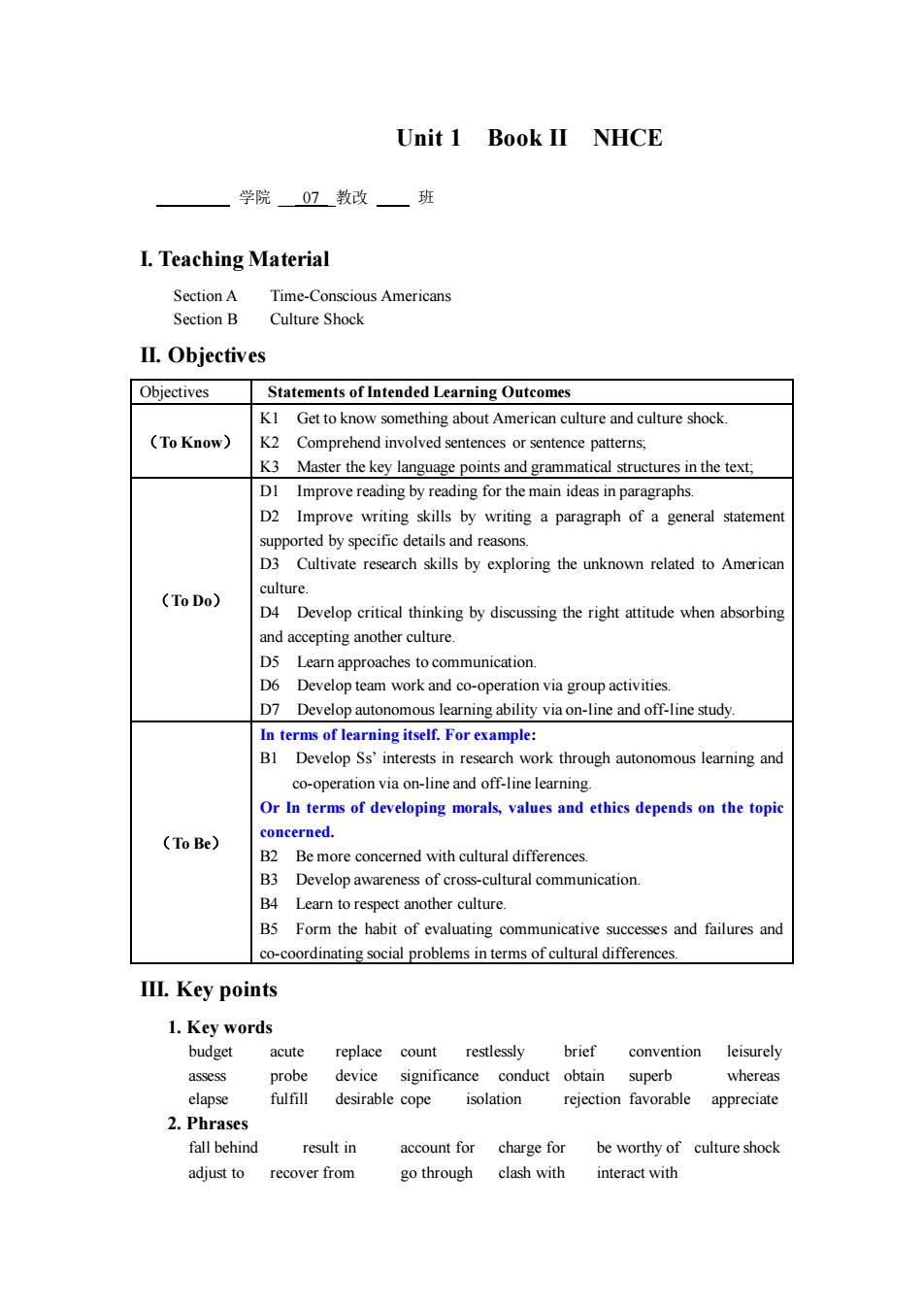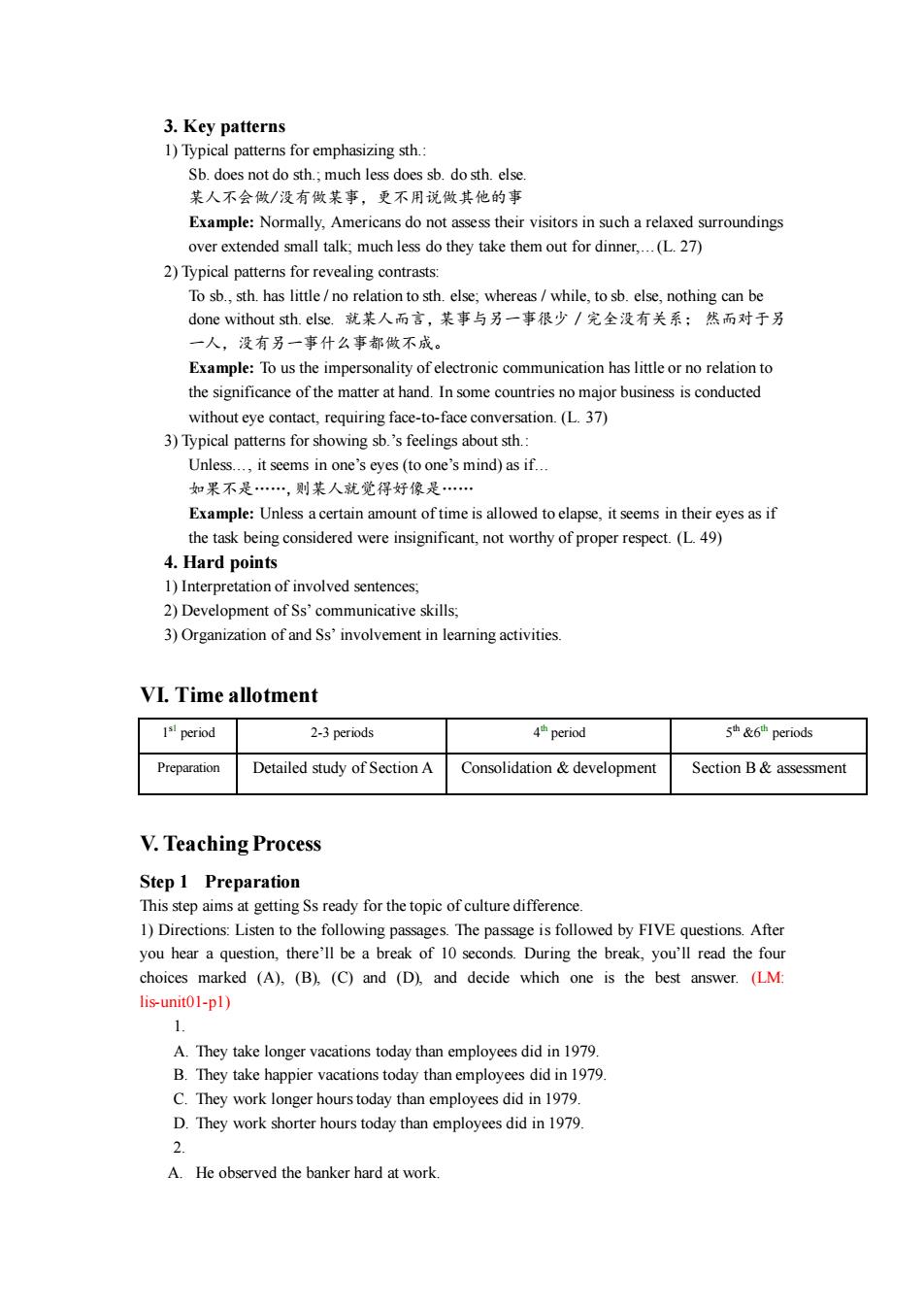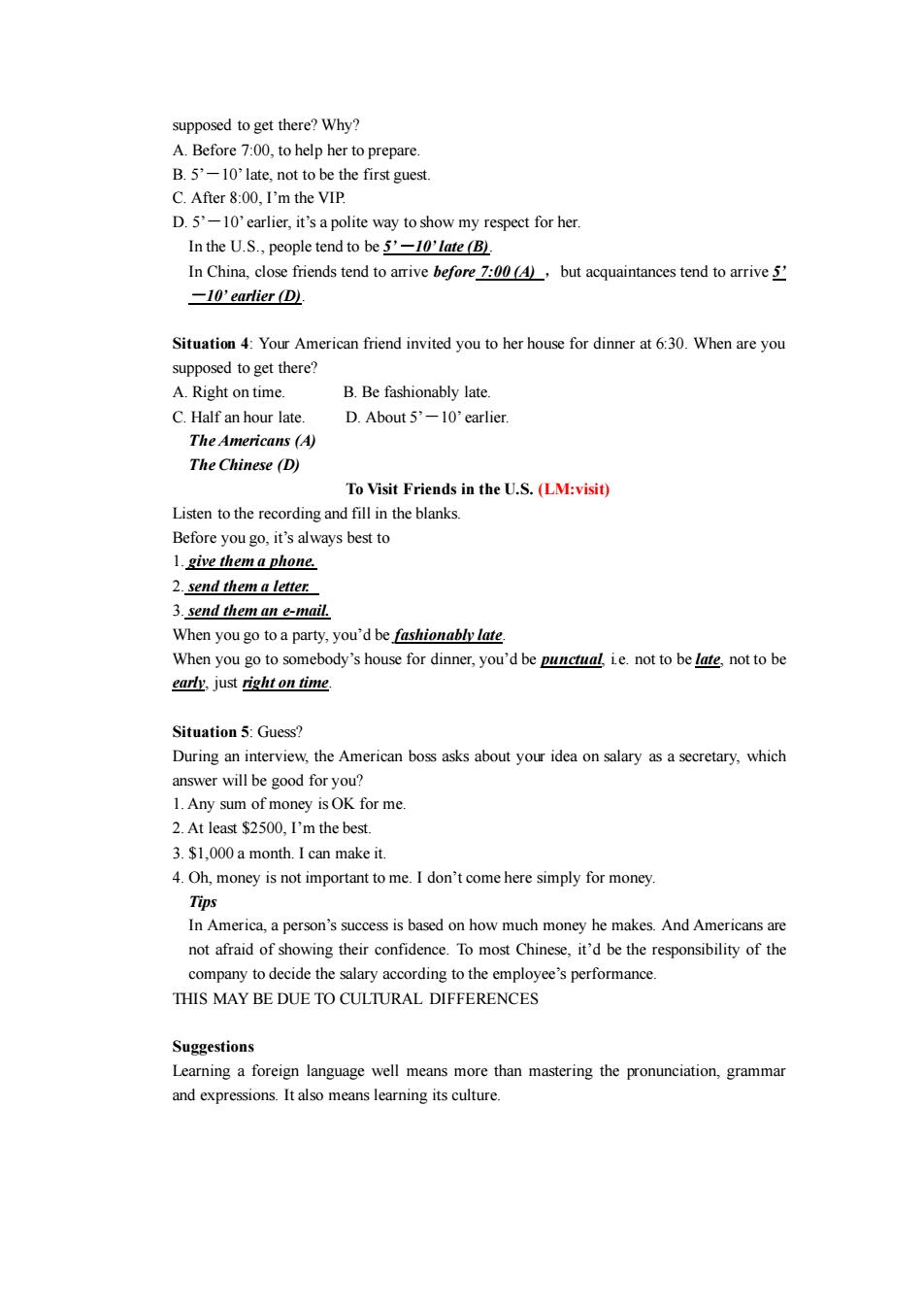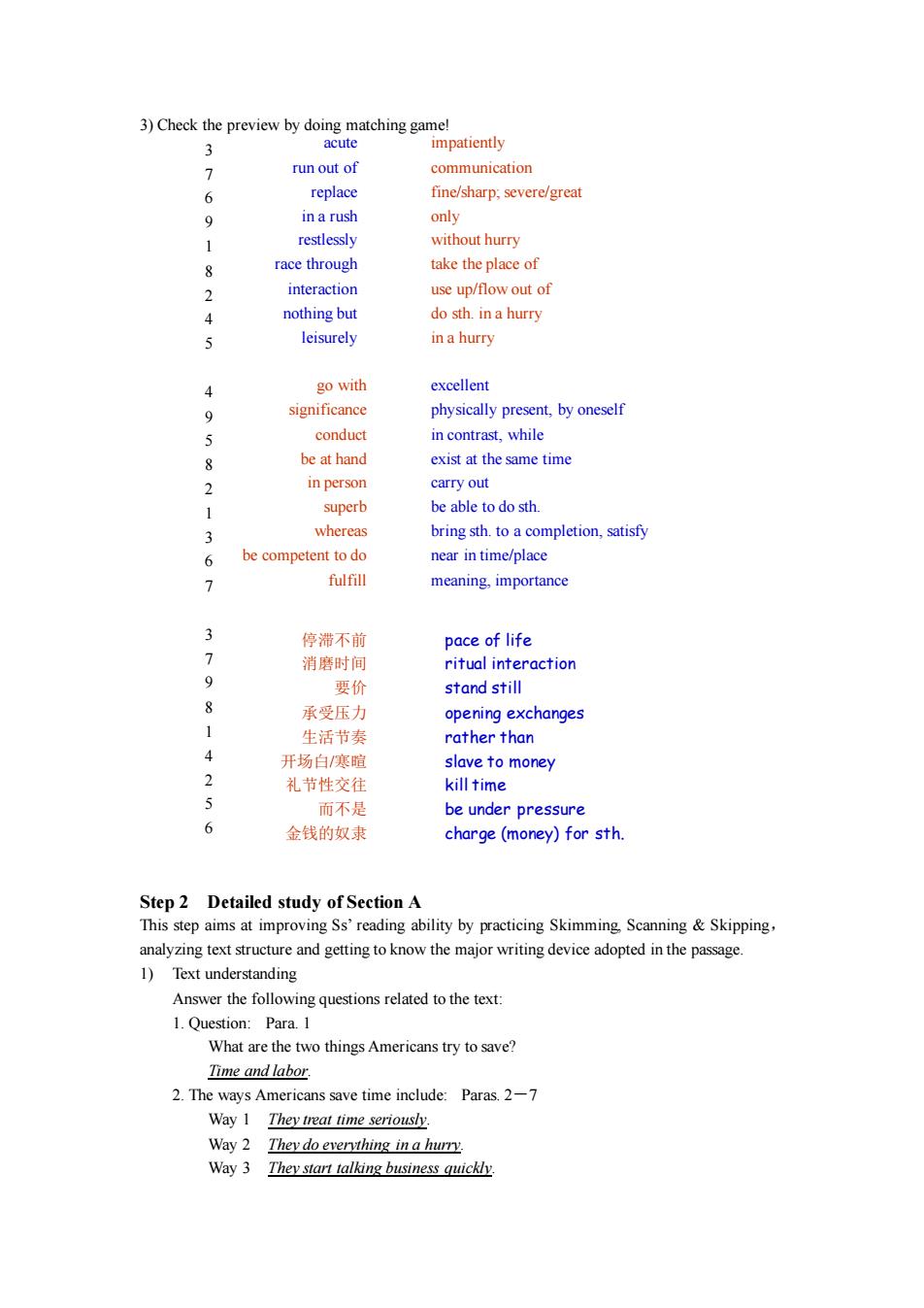
Unit1BookⅡNHCE 学院07教改一班 I.Teaching Material Time-Conscious Americans Section B Culture Shock II.Objectives Objectives Statements of Intended Learning Outcomes KI Get to know something about American culture and culture shock (To Know) K2 Comprehend involved sentences or sentence patterns; K3 Master the key language points and grammatical structures in the text. DI Improve reading by reading for the main ideas in paragraphs. D2 Improve writing skills by writing a paragraph of a general statemer supported by specific detail and reasons. D3 Cultivate research skills by exploring the unknown related to Americar culture. (To Do) D4 Develop critical thinking by discussing the right attitude when absorbing and accepting another cuture. D5 Learn approaches to c D Develop team work and co-operation via group activitie D7 Develop autonomous learning ability via on-line and off-line study. In terms of learning itself.For example: Bl Develop Ss'interests in research work through autonomous learning and co-operation via on-ine and off-lineearing Or In terms of developing morals,values and ethics depends on the topic concerned. (To Be) B2 Be more concerned with cultural differences B3 Develop awareness of cross-cultural communication B4 Learn to respect another culture Formthe habit of filuresand co-coordinating social problems in terms of cultural differences. III.Key points 1.Key words budget acute replace count restlessly brief convention leisurely assess probe device significance conduct obtain superb whereas elapse fulfill desirable cope isolation rejection favorable appreciate 2.Phrases fall behind account for charge for be worthy of culture shock adjust to recover from go through clash with interact with
Unit 1 Book II NHCE 学院 _07_教改 班 I. Teaching Material Section A Time-Conscious Americans Section B Culture Shock II. Objectives Objectives Statements of Intended Learning Outcomes (To Know) K1 Get to know something about American culture and culture shock. K2 Comprehend involved sentences or sentence patterns; K3 Master the key language points and grammatical structures in the text; (To Do) D1 Improve reading by reading for the main ideas in paragraphs. D2 Improve writing skills by writing a paragraph of a general statement supported by specific details and reasons. D3 Cultivate research skills by exploring the unknown related to American culture. D4 Develop critical thinking by discussing the right attitude when absorbing and accepting another culture. D5 Learn approaches to communication. D6 Develop team work and co-operation via group activities. D7 Develop autonomous learning ability via on-line and off-line study. (To Be) In terms of learning itself. For example: B1 Develop Ss’ interests in research work through autonomous learning and co-operation via on-line and off-line learning. Or In terms of developing morals, values and ethics depends on the topic concerned. B2 Be more concerned with cultural differences. B3 Develop awareness of cross-cultural communication. B4 Learn to respect another culture. B5 Form the habit of evaluating communicative successes and failures and co-coordinating social problems in terms of cultural differences. III. Key points 1. Key words budget acute replace count restlessly brief convention leisurely assess probe device significance conduct obtain superb whereas elapse fulfill desirable cope isolation rejection favorable appreciate 2. Phrases fall behind result in account for charge for be worthy of culture shock adjust to recover from go through clash with interact with

3.Key patterns Sb.does not do sth.;mu less does sb.do sth.else 某人不会做/没有做某事,更不用说做其他的事 Example:Normally,Americans do not assess their visitors in such a relaxed surroundings over extended small talk:much less do they take them out for dinner.(L 27) 2)Typical patters for revealing onrasts has litle/norelation to wherea /while,to sb.els e,nothing can be done without sth.clse.就莱人而言,某事与另一事很少/完全没有关系:然而对于另 一人,没有另一事什么事都做不成。 Example:To us the impersonality of electronic communication has little or no relation to the significance of the matter at hand.In some countriesnomajor business is conducted without eye con t.requiring fa ace-to-face convers tion.(L37) 3)Typical patterns for showing sb.'s feelings about sth. Unless.it seems in one's eves (to one's mind)as if 如果不是.,则某人就登得好使是,. Example:Unless acertain amount oftime isallowed in their eyes as if the task being considered were insignificant,no worthy of proper respect.(L9) 4.Hard points 1)Interpretation of involved sentences, 2)Development of Ss'communicative skills; 3)Organization of and Ss'involvement in learning activities. VI.Time allotment 1"period 2-3periods 4period periods Preparation Detailed study of Section A Consolidation development Section B&assessment V.Teaching Process Step1 Preparation sstep aims at getting Ss ready for the topic of cuture difference. 1)Directions:Listen to the following passages.The passage is followed by FIVE questions.After you hear a question,there'll be a break of 10 seconds.During the break,you'll read the four choices marked (A).(B)(C)and (D).and decide which one is the best answer.(LM lis-unitol-pl) 1 A.They take longer vacations today than employees did in 1979 B.They take happier vacations today than employees did in1979 C.They work longer hours today than employees did in 1979. D.They work shorter hours today than employees did in 1979 A.He observed the banker hard at work
3. Key patterns 1) Typical patterns for emphasizing sth.: Sb. does not do sth.; much less does sb. do sth. else. 某人不会做/没有做某事,更不用说做其他的事 Example: Normally, Americans do not assess their visitors in such a relaxed surroundings over extended small talk; much less do they take them out for dinner,.(L. 27) 2) Typical patterns for revealing contrasts: To sb., sth. has little / no relation to sth. else; whereas / while, to sb. else, nothing can be done without sth. else. 就某人而言,某事与另一事很少/完全没有关系; 然而对于另 一人,没有另一事什么事都做不成。 Example: To us the impersonality of electronic communication has little or no relation to the significance of the matter at hand. In some countries no major business is conducted without eye contact, requiring face-to-face conversation. (L. 37) 3) Typical patterns for showing sb.’s feelings about sth.: Unless., it seems in one’s eyes (to one’s mind) as if. 如果不是.,则某人就觉得好像是. Example: Unless a certain amount of time is allowed to elapse, it seems in their eyes as if the task being considered were insignificant, not worthy of proper respect. (L. 49) 4. Hard points 1) Interpretation of involved sentences; 2) Development of Ss’ communicative skills; 3) Organization of and Ss’ involvement in learning activities. VI. Time allotment 1 s1 period 2-3 periods 4 th period 5 th &6th periods Preparation Detailed study of Section A Consolidation & development Section B & assessment V. Teaching Process Step 1 Preparation This step aims at getting Ss ready for the topic of culture difference. 1) Directions: Listen to the following passages. The passage is followed by FIVE questions. After you hear a question, there’ll be a break of 10 seconds. During the break, you’ll read the four choices marked (A), (B), (C) and (D), and decide which one is the best answer. (LM: lis-unit01-p1) 1. A. They take longer vacations today than employees did in 1979. B. They take happier vacations today than employees did in 1979. C. They work longer hours today than employees did in 1979. D. They work shorter hours today than employees did in 1979. 2. A. He observed the banker hard at work

B He talked with the banker for a whole day C.He helped the banker conduct business He praised the banker for his good work A.The connection between time and productivity is always positive. B.The connection between time and productivity is not always positive. C.between time and be positive D The cor ction between time and productivity should always be positive A.The banker spent 70 percent of his time doing busy work B.The banker spent all of his time doing busy work. C.The banker spent 90 percent of his time doing busy work D. The banker spent of his time doing busy work A.Employers evaluate employees according to the amount of time on the job B.Employers evaluate employees according to their job performance. C.Emplovers evaluate emplovees according to the working time and job performanc according to their and jobefficieny. Key 2.A 3.B 4.D5.C 2)Let's talk about culture differences! How to Manage the Following Situations? Situation1-an appointment Situation 2-hom Situation3-toa party Situation 4-being invited to dinner Situation 5-an interview Arabia His opening day was booked fully a week ago.But half an hour passed,neither of his first two patients arrived.Why? Americans tend to be punctual. To the Arabians.half an hour or 40 minutes late is acceptable Situation 2:On your way home,it occurred to you that your American friend Mary had invited you to visit her when you were free.Then you dropped in on her house.But when you knocked at the door Mary felt surprised.Why? In China.it's OK to visit friends without calling ahead of time While in the U.S.it'simpolite to doso What is the polie way in theU Calling ahead of time Situation 3:Your American friend invited you to her party tonight at 7:30.When are you
B. He talked with the banker for a whole day. C. He helped the banker conduct business. D. He praised the banker for his good work. 3. A. The connection between time and productivity is always positive. B. The connection between time and productivity is not always positive. C. The connection between time and productivity should never be positive. D. The connection between time and productivity should always be positive. 4. A. The banker spent 70 percent of his time doing busy work. B. The banker spent all of his time doing busy work. C. The banker spent 90 percent of his time doing busy work. D. The banker spent 80 percent of his time doing busy work. 5. A. Employers evaluate employees according to the amount of time on the job. B. Employers evaluate employees according to their job performance. C. Employers evaluate employees according to the working time and job performance. D. Employers evaluate employees according to their work attitude and job efficiency. Key 1.C 2.A 3.B 4.D 5.C 2) Let’s talk about culture differences! How to Manage the Following Situations? Situation 1 – an appointment Situation 2 – home visit Situation 3 – to a party Situation 4 – being invited to dinner Situation 5 – an interview Situation 1: Dr. Tom McDivern from NY is practicing medicine in a rural area in Saudi Arabia. His opening day was booked fully a week ago. But half an hour passed, neither of his first two patients arrived. Why? Americans tend to be punctual. To the Arabians, half an hour or 40 minutes late is acceptable. Situation 2: On your way home, it occurred to you that your American friend Mary had invited you to visit her when you were free. Then you dropped in on her house. But when you knocked at the door . Mary felt surprised. Why? In China, it’s OK to visit friends without calling ahead of time. While in the U.S., it’s impolite to do so. What is the polite way in the U.S.? Calling ahead of time. Situation 3: Your American friend invited you to her party tonight at 7:30. When are you

supposed to get there?Why? B.5 -10'late,not to be the first guest C.After 8:00.I'm the VIP D.5-10earlier,it'sapolite way to show my respect for her. In the U.S.people tend to be 5'-10'late (B). In China,close friends tend to amrive()but acquaintances tend to arrive -10'earlier (D). Situation 4:Your American friend invited you to her house for dinner at 6:30.When are you supposed to get there? a right on time b Be fashionably late C.Half an hour late D.About 5'-10"earlie The Americans(A) The Chinese (D) To Visit Friends in the U.S.(LM:visit) Listen to the recording and fill in the blanks. Befor ays best to ne 2.send them a letter 3.send them an e-mail. When you go to a party,you'd be fashionably late When you go to somebody's house for dinner,you'd be.not to be la not to be just right on time Situation 5:Guess? During an interview,the American boss asks about your idea on salary as a secretary,which er will be good for you? 1.An eyis for me. 2.At least $2500.I'm the best 3.$1.000 a month.I can make it 4.Oh,money is not important to me.I don't come here simply for money son's suce ess is based on how much money he makes.And Americans are not afraid of showing their confidence.To most Chinese,it'd be the responsibility of the company to decide the salary according to the employee's performance THIS MAY BE DUE TO CULTURAL DIFFERENCES Suggestions Learning a foreign language well means more than mastering the pronunciation,gramma and expressions.It also means learning its culture
supposed to get there? Why? A. Before 7:00, to help her to prepare. B. 5’-10’ late, not to be the first guest. C. After 8:00, I’m the VIP. D. 5’-10’ earlier, it’s a polite way to show my respect for her. In the U.S., people tend to be 5’-10’ late (B). In China, close friends tend to arrive before 7:00 (A) ,but acquaintances tend to arrive 5’ -10’ earlier (D). Situation 4: Your American friend invited you to her house for dinner at 6:30. When are you supposed to get there? A. Right on time. B. Be fashionably late. C. Half an hour late. D. About 5’-10’ earlier. The Americans (A) The Chinese (D) To Visit Friends in the U.S. (LM:visit) Listen to the recording and fill in the blanks. Before you go, it’s always best to 1. give them a phone. 2. send them a letter. 3. send them an e-mail. When you go to a party, you’d be fashionably late. When you go to somebody’s house for dinner, you’d be punctual, i.e. not to be late, not to be early, just right on time. Situation 5: Guess? During an interview, the American boss asks about your idea on salary as a secretary, which answer will be good for you? 1. Any sum of money is OK for me. 2. At least $2500, I’m the best. 3. $1,000 a month. I can make it. 4. Oh, money is not important to me. I don’t come here simply for money. Tips In America, a person’s success is based on how much money he makes. And Americans are not afraid of showing their confidence. To most Chinese, it’d be the responsibility of the company to decide the salary according to the employee’s performance. THIS MAY BE DUE TO CULTURAL DIFFERENCES Suggestions Learning a foreign language well means more than mastering the pronunciation, grammar and expressions. It also means learning its culture

3)Check the preview by doing matching game! acute impatiently run out of communication replace fine/sharp:severe/great ina 8 race through take the place of interaction use up/flow out of nothing but do sth.in a hurry le urely in a hurry go with excellent significance physically present,by oneself conduct in contrast while be at hand exist at the same time in pers superb be able to do st whereas bring sth.to a completion,satisfy 67 be competent to do near in time/place fulfil meaning importance 停滞不前 pace of life ritual interactior 要价 stand still 承受压力 opening exchanges 生活节奉 ther than 开场 /寒 % e to oney 礼节性交 kill time 而不是 be under pressure 6 金钱的奴隶 charge(money)for sth Step 2 Detailed study of Section A This step aims at improving Ssreading ability by practicing Skimming Scanning&Skipping d getting to k major writing device adopted in the passag Answer the following questions related to the text: 1.Question:Para.1 What are the two things Americans try to save? Time and labor 2.The ways Americans save time include:Paras.2-7 Way 1 They treat time seriously. Way 2 They do everthing in a hurry. Way 3 They start talking business quickly
3) Check the preview by doing matching game! 3 7 6 9 1 8 2 4 5 4 9 5 8 2 1 3 6 7 3 7 9 8 1 4 2 5 6 Step 2 Detailed study of Section A This step aims at improving Ss’ reading ability by practicing Skimming, Scanning & Skipping, analyzing text structure and getting to know the major writing device adopted in the passage. 1) Text understanding Answer the following questions related to the text: 1. Question: Para. 1 What are the two things Americans try to save? Time and labor. 2. The ways Americans save time include: Paras. 2-7 Way 1 They treat time seriously. Way 2 They do everything in a hurry. Way 3 They start talking business quickly. acute run out of replace in a rush restlessly race through interaction nothing but leisurely impatiently communication fine/sharp; severe/great only without hurry take the place of use up/flow out of do sth. in a hurry in a hurry go with significance conduct be at hand in person superb whereas be competent to do fulfill excellent physically present, by oneself in contrast, while exist at the same time carry out be able to do sth. bring sth. to a completion, satisfy near in time/place meaning, importance 停滞不前 消磨时间 要价 承受压力 生活节奏 开场白/寒暄 礼节性交往 而不是 金钱的奴隶 pace of life ritual interaction stand still opening exchanges rather than slave to money kill time be under pressure charge (money) for sth